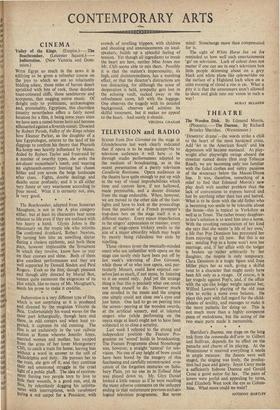TELEVISION and RADIO
SCENES from Don Giovanni on the stage at Glyndebourne last week clearly indicated that if opera is to be made acceptable to television audiences it will have io be through studio performances adapted to the medium of broadcasting, as in the recent presentation of a purely television Cavalleria Rusticana. Opera audiences in the theatre have quite enough to put up with in the way of visual improbabilities which time and custom have, if not hallowed, made permissible, and a decent distance from the stage endurable. When, however, we are moved to the other side of the foot- lights and have to look at the proceedings from the position of a French prompter's trap-door box on the stage itself it is a different matter. Every minor imperfection in the singers' appearances or manner, every piece of stage-opera trickery swells to the size of a major absurdity which may begin by merely being ridiculous but ends by repelling.
Those viewers (even the musically-minded ones) who are unfamiliar with opera on the stage can surely only have been put off by last week's televising of Don Giovanni, while those of us who love opera, and par- ticularly Mozart, could have enjoyed our- selves just as much, if not more, by listening to it on sound only. .nd yet the strange thing is that this is precisely what one could not bring oneself to do. However much one revelled in the music and the singing one simply could not close one's eyes and just listen. One had to go on peering into the screen—peering at the wooden swords, at the artificial scenery, and at talented singers who (while performing on the opera stage at least) ought not to have been subjected to so close a scrutiny.
Last week I referred to the strong and independent position the Feature Pro- gramme on 'sound' holds in broadcasting. The Feature Programme about Stonehenge was, however, a straight 'natural' for tele- vision. No one of any height of brow could have been bored by the imagery of this fascinating and carefully reconstructed evo- cation of the forgotten centuries on Salis- bury Plain, yet no one as in Tollund Man was played down to. Mr. Glyn Daniel looked a little uneasy as if he were recalling the many adverse comments on the unhappy ending to that unfortunate previous arch wo- logical television programme. But never mind: Stonehenge more than compensated for it.
The sight of White Horse Inn on Ice reminded us how well such entertainments 'go' on television. Lack of colour does not matter if one can see in one's television box little people skimming about on a grey black and white plane like ephemeridae on the surface of a Highland loch when on a calm evening of cloud a rise is on. What a pity it is that the announcers aren't allowed to skate and glide into our vision in such a way!
MORAY MCLAREN


































 Previous page
Previous page